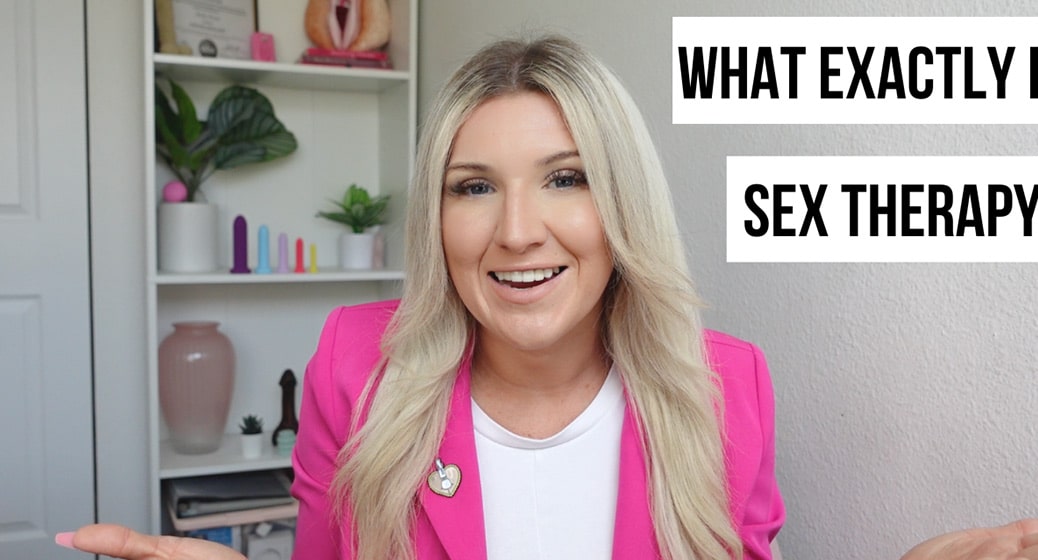Sex therapy is first and foremost a form of psychotherapy.
Sex therapy is rarely just about sex. Sex therapy is a type of talk therapy that’s designed to help individuals and couples address medical, psychological, personal, or interpersonal factors impacting sexual satisfaction. The goal of sex therapy is to help people move past physical and emotional challenges to have a satisfying relationship and pleasurable sex life.
What do sex therapists treat?
Sex therapy focuses on the treatment for sexual concerns that cause distress, and uses a bio-psycho-social framework to address the biological, psychological, and social factors that influence one’s experience of sex and sexuality. It often includes collaborations with other types of providers, such as physicians, psychiatrists, endocrinologists, and physical therapists (to name a few), to provide support for the entire person. Sexual dysfunction is common. In fact, 43 percent of women and 31 percent of men report experiencing some type of sexual dysfunction during their lifetimes (Rosen, 2000). These dysfunctions may include:
-
Sexual Trauma
-
Orgasm Difficulties
-
Sexual Shame
-
Low Libido
-
Lack of Desire/Interest
-
Erectile Dysfunction
-
Premature Ejaculation
-
Lack of Response to Sexual Stimulus
-
Performance Anxiety/ Low Sexual Self-Esteem
-
Pain during sexual activity
-
Vaginismus or Vulvodynia
-
Sexual Identity Concerns
-
Sexually Transmitted Infections
-
Serial relationships (also called “serial monogamy”)
-
Infidelity
-
Avoidance of love and intimacy
-
Body image concerns
-
Out of Control or Compulsive Sexual Behaviors
-
Distressing or Unwanted Sexual Thoughts
-
Desire Discrepancy in Relationships
-
A Desire to Explore Consensual Non-monogamy
“Good Sex Therapy” treatment includes building a therapeutic alliance which necessitates assessment and a client-centered orientation to the values and situated meaning-making of sex and gender and the current distress. It is not a univocal approach and often is collaborative and affirming.
How to know if sex therapy is the right choice for you
Deciding if sex therapy is the right choice for you as a client is a personal decision. Here are some considerations to help you determine if sex therapy might be beneficial for you:
-
Identify specific concerns: Reflect on the specific sexual concerns or issues you are experiencing. These could include difficulties with sexual desire, arousal, orgasm, pain during sex, or challenges within your relationship related to sex. If these concerns are causing distress or impacting your overall well-being, sex therapy may be worth considering.
-
Previously attempted approaches: If you have already tried self-help strategies or interventions to address your sexual concerns without significant improvement, seeking the guidance of a sex therapist could be beneficial. If you have already worked with a traditional therapist and have found that they do not have enough comfort or expertise to discuss your sexual concerns, sex therapy may be for you. A sex therapist can offer professional expertise and evidence-based techniques tailored to your specific needs.
-
Openness to therapy: Consider your willingness to engage in therapy and discuss intimate details about your sexual health and experiences. Sex therapy requires open and honest communication with the therapist, as well as a willingness to explore and address underlying emotional, psychological, or relational factors contributing to the concerns.
-
Impact on daily life and relationships: Assess how your sexual concerns are affecting your daily life, relationships, and overall well-being. If they are causing distress, affecting your self-esteem, creating tension within your relationship, or leading to avoidance of sexual activities, seeking the help of a sex therapist can be beneficial in addressing these issues.
-
Desire for professional guidance: If you feel overwhelmed, confused, or lacking in knowledge about sexual matters, a sex therapist can provide valuable guidance and education. They can help you understand your sexual concerns, normalize your experiences, and provide evidence-based strategies to enhance sexual well-being.
Ultimately, the decision to pursue sex therapy is a personal one. If you’re uncertain, you can also schedule an initial consultation or phone call with a sex therapist to discuss your concerns and see if their approach aligns with your needs and goals. Remember, we work for you!
Keep Reading
Want more? Here are some other blog posts you might be interested in.








